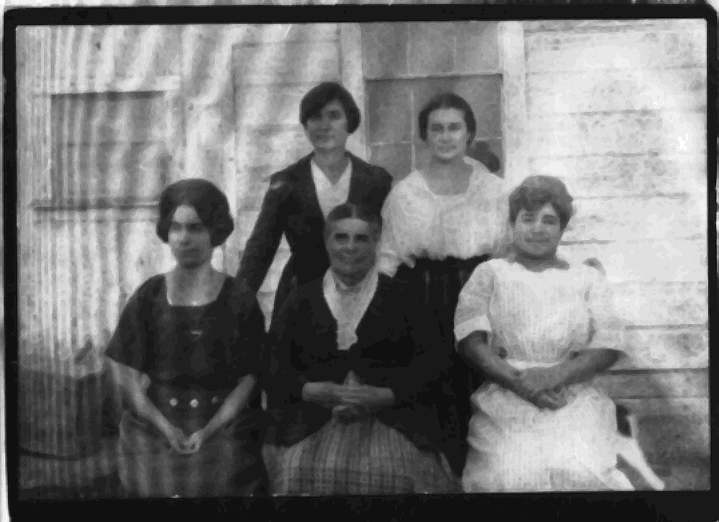

Rosa Cereghino came from Geno, Italy to marry Frank Boitano. She lived with her husband and four daughters: Angelina, Anna Catherina, Jennie, and Mary Elizabeth. After Frank's death Rosa lost most of her land, but was able to retain enough to live on. Mary became ill with cancer and was unable to take care of her children or work, so her mother tried to provide assistance. Unfortunately, she was killed in a freak accident by an electric street-car (run by the county). Rosa had left a bundle of shopping on the car and was attempting to retrieve it when she was struck by the car. A piece of machinery hit her body and threw her from the platform on which she standing, crushing her under the car and breaking her neck and back. A jury later ruled that the death was accidental, but that the platform was too close to the car and needed to be moved. The daughters were given settlements; Mary used hers to purchase the house on Morgan Street.
Rosa's death shocked the Fairfield/Suisun community and was reported in a large article in the local paper:
The joys of the Christmas season were turned to sorrow for a number of local people Saturday when Mrs. Rosa Boitano, 60, a resident here for fourty-two years was instantly killed by the Northern Electric car at Boitano Station opposite her home, two miles east of Fairfield at 1:55 o'clock. A passing autoist from Cement was haled by the conductor of the electric car, and Dr. H. V. Clymer was sent to the scene of the tragedy, but found that the unfortunate woman had been killed instantly, suffering a broken neck, crushed ribs, a broken collar bone and injured knee. A. Toselli, son-in-law of deceased, and others hastened to the scene and the remains were brought to the F. D. Sweet Undertaking parlors. Mrs. Boitano had been shopping in Suisun during the morning, placed some bundles on the electric car intending to ride to her home when the car pulled out on its regular trip to Vacaville. She missed connections with the car and got a ride home with a neighbor. Going out to the railroad track to get her bundles on the return trip of the car, she crossed the track as the car was slowing down but was struck before she could get to the platform beside the track. It is stated that a portion of the mechanism known as the third rail shoe, struck her knee, throwing her with such force as to break her neck; the body falling between the tracks and the platform. The funeral was held a St. Alphonsus Catholic Church, at 10 o'clock Tuesday morning, with requiem mass, Father Bresnan officiating. The choir was composed of A. C. Tillman, John Philes, Mrs. Svena Corcoran, Mrs. Grace Harry, Mrs. M. P. Sherman. Interment was in Fairfield Cemetery. The pallbearers were: A. Toselli, L. Watson, Frank Elmo, Joe Brady, L. Maltagliati, and Tony Guisti. Mrs. Rosa Boitano was born near Genoa, Italy, in 1864, and came to America many years ago, having resided at her farm home here for the past 42 years. Her husband died more than thirty years ago. She is survived by four daughters, Mrs. A. Toselli, Mrs. L. Watson, of San Jose, Mrs. Frank Elmo, Mrs. Joe Brady. The sorrowing relatives have the sympathy of the community.--From The Solano County Republican, Thursday, December 25, 1924
A local jury, sitting befor Frank D. Sweet, deputy County coroner, Monday night, returned a verdict of accidental death in the case of Mrs. Rosa Boitano, who was killed by the Sacramento Northern electric car near here on Saturday. Attorney Theodore Chester of Sacramento was here to represent the Railroad company, while Attorney W. U. Goodman represented the relatives of the deceased. The jury was composed of, R. E. Brooks chairman, A. E. Hearst, H. L. Weitz, Victor Bacherini, Wm. Haggerty, Geo. Paul, Chas. Koch and Harry James.--From the Solano County Republican, date unknown
Rosa's granddaughter, Linda Mafalda (who died in 1997), remembers her grandmother this way:
Sure I knew her. She lived across the field from us when we lived on the ranch in Tolenas: us kids had to go past her place everyday on the way to school--which was "Dover School". . . She was a--Dolly Lambro (Early 1990s)real grandma--most of the time she wore black gathered skirts and blouses[s] mostly whitealways an apron and bonnets on her head. She was a real Italian lady. . . [Her] house was maybe a small half block from the gate. Outside the gate and just a very few steps away was the streetcar tracks with a wooden platform for us to wait on. The streetcar ran from Suisun to Cement and back again. Grandma used to take it there to get to town. She used to dress real pretty when she came to town--always her black skirts and white frilly blouses, always a hat with flowers--a black leather purse and gloves. She always brought peppermints in her purse for the kids (the old fashioned kind). I was going into the second grade when we moved to Suisun so the ladies (mom [Mary Elizabeth] and her sisters [Lena and Annie]) could work in the cannery. We lived in a couple of cannery cottages--until a large vacant one was empty. Then we moved into it. . .Grandma use[d] to come see my "mom" when she was sick. . .[M]y mom was still alive (Barely) when of day Swede's [Elmer Ellard Lorenzen] father [Hans Lorenzen] came and told us that "grandma" was killed by that streetcar!! I don't know whether she was coming into town or getting home. Anyway she got tangled up somehow with that street-car. I guess she fell or something.

